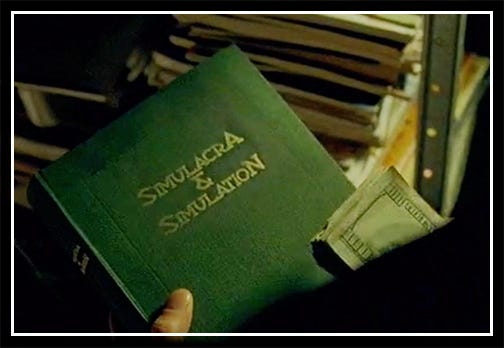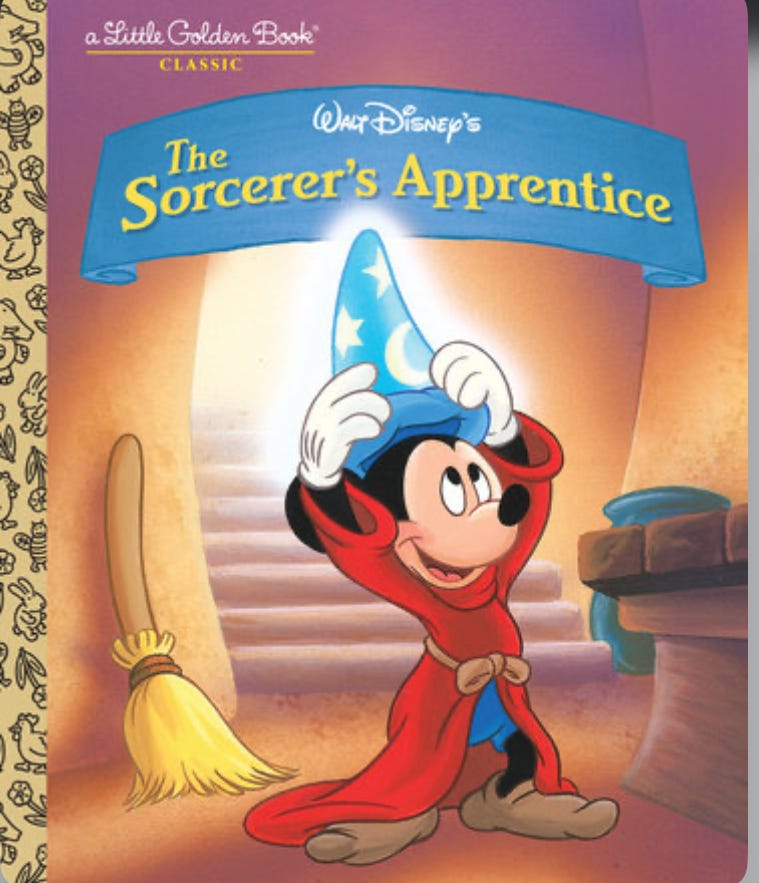NB: This essay was inspired in part by two essays, one by
and another by . I should also thank , hostess of the salon I reference below.I am not, in any sense, a tech bro. Even as I type this on my computer and phone I have no real knowledge or interest in how either actually works, nor any desire to pursue such. I have no head for hardware or coding or even very basic math. If you told me that elves lived inside the machine in front of me and animated it with their fairy dust, I would have to give wary assent to your claims.
I would guess they’re loading some RAM?
I say all this by way of disclaimer, because in writing this about AI I suspect the first thing people will do in response is challenge my knowledge of how it works, what it can do, etc. I fully concede that I don’t know much about the specifics of how something like Chat GPT operates. Nonetheless, I know enough to know that despite what it promises I believe it is a dead end for humanity, and I plan to make no further use to it in any form, insofar as I am able.
I hadn’t planned on writing about this; it’s not the sort of thing I’m interested in in its own right. But I came to the topic by way of some things that do mean a lot to me, education and the future of teaching, as well as the prospect of a general cultural revival. Two events, some weeks apart, gave me occasion to reflect on the subject of AI despite myself. But of course, one cannot escape AI online, in any sense, and thus it was probably inevitable I would have to develop some way of approaching it sooner or later.
The first event that brought AI to my attention was a professional development session given at my school on the subject by one of the administrators, whose exact title escapes me (for a small private school we have a surprisingly high concentration of functionaries). This particular manager was tasked with explaining to us how to spot when students were using AI to cheat- when they had used Chat GPT to write their essays for them and such. He explained how it worked: prompted by the student, the program scanned the whole of the internet for every example of writing relevant to the established parameters and then generated original text as a kind of extremely sophisticated pastiche of existing work. It could be customized to an astonishing degree and, as the product was wholly original, could not be detected by plagiarism detectors and the usual cut-and-paste matches to Wikipedia.
In general, one can fairly easily tell when a dull student has recourse to such things, as what emerges will be obviously beyond their powers and they will, in Dunning-Kruger obliviousness, be wholly unaware of how different it is from what they can create unaided. They will tell the AI to produce a paper about Napoleon of the required length and feign genuine offense when the teacher questions their command of the intricacies of voltigeur deployment at the Battle of Borodino when the assignment called for a review of the new film. The real problems come from the smart ones, the ones with enough self awareness and understanding of how their work will be perceived to put real and effective work into faking it. They are capable of fooling teachers, especially given that they both are generally above suspicion and that teachers want them to succeed. I have no doubt some have slipped past me, though I’m actually fairly good at sensing when something is off.
The tips he gave to combat this new form of cheating were intuitive and obvious- most professional development is useless. But what was interesting was what came next. The administrator proceeded to tell us that Chat GPT was not really the enemy, but rather, something we should embrace in our teaching. “Look,” he told us, “how easily it can generate tests.” He produced a multiple-choice math quiz in an instant. “For you language teachers, it can carry on conversations in whatever language with your students.” Many of the teachers audibly marveled as he asked the program to generated a wall of Spanish text in the persona of a well-meaning abuela, fully interactive. And so it went, with him hard-selling to a room full of teachers all the things AI could do to make us obsolete, to general approval.
Of course, for some people that’s a feature and not a bug. Already many college courses at the general level are mostly or entirely premade and given to contingent faculty with no say in the content of what are ostensibly their own classes (it’s funny, but when you look it up, the phenomenon is unmentioned online, even though it is ubiquitous). I ‘teach’ some of them, and my input is limited to grading discussion posts according to a pre-determined rubric. I would venture that nearly all of the posts from students are AI generated, as the smooth prose bears no resemblance to the ad hoc English of their emails. The system doesn’t care so I’m not allowed to do so either.
But of course, in a few years time I’ll be out of work in that field, as AI will come fully into its own. Chat GPT will be automatically grading Chat GPT generated prose, which will in turn become fuel for further Chat GPT prose with and against which the system will measure quality. AI will deposit Pell Grant funds and student loan money into accounts which another AI will automatically debit for four years until another AI counts up the credits and issues an online credential which yet another AI will reference on behalf of some company looking for a new tech worker, whose job it will be to use AI to generate content for said company until such time as an upgraded AI can render him obsolete, at which point some government AI will automatically send his welfare funds to marijuana dispensaries and AI generated e-girls, customized to his tastes, which he imagines are unique, until he dies.
I sat thinking about this in that meeting. An AI text cannot be but some average of what the internet provides. What it produces is original in the sense that nothing else exactly like it exists, but it is necessarily some distillation of the human work of millions of individuals. It is by definition mediocre; even if one selects for the best work in a field it will be the mean of them in some way. To use AI in my own teaching, to give my students something like that, is to train their minds to accept that sort of thing as normal-AI prose as normative- and to in turn encourage them to produce their own prose along those lines. Assuming they continue to write their own work, it will look like the stuff AI produces because that is what I have offered them as a model. The work they generate will in turn become part of that great mass of text used as fuel for the AI generation machine, which the students will then use as a further degraded model, which will be fed once more into the AI system, an endless churn of copies without originals, a Baudrillardian nightmare simulacrum.
“I know Po-Mo.”
“Show me…”
What’s wrong with all of this, some of you may wonder. Perhaps you like the idea of all those teachers and professors and doctors and administrators being fired and sent packing. If so, you’re a Republican. [EDIT: Republicans are magical creatures whom one insults at his or her own peril. Even when the author very obviously agrees that higher education and bureaucracy in general should be curtailed, he should NEVER associate this goal with Republicans, despite their decades-long strident advocacy for the same.]. Perhaps you imagine with those gatekeepers gone you and AI would be free to learn as you please, and some new great age- some Renaissance- would result. That’s within the realm of possibility, but perhaps you missed something.
This was covered at the second event I mentioned, a wonderful online salon I attended. The participants were bright and interesting, but my impression was that they seemed to skew as enthusiasts for AI, consistently described as a “tool,” which was, used correctly, characterized as an overall benefit to mankind. I should first of all concede that on an individual level AI can be useful and a medium of aesthetic expression. I have seen interesting AI art; my own profile picture is AI. But I think a lot about the use of it as a ‘tool’ in a wider social context, which is my main point here. That word, “tool,” came up not only at the salon but in the professional development session as well, and seems to be a common frame of reference. It brought it my mind the words of Boromir describing the One Ring at the Council of Rivendell:
“It is a gift, a gift to the foes of Mordor!”
Apropos the word “tool;” here I beg to differ on semantic and historical grounds. For most of the human past men were tool users. A tool is an extension of the body and thus the will; the flint knife is by human artifice the equivalent of the teeth and claws of a beast. So it went until the Industrial Revolution and the rise of machines. A machine is superficially similar to a tool, but rather than being an extension of the body it is a kind of replacement body, not an instrument but a whole system. And rather than being an extension of the will a machine is a subtle subversion of it; being a system it has a mode of operation to which the user must conform for it to operate. Systems change us. By means of tools we shape our environment but our machines shape us in turn. We become, over time, through processes of artificial and social selection, the sorts of creatures best adapted to use them, or else we become economically and humanly obsolete.
The theoretical potential of machines to liberate us into a higher state of being remains, historically speaking, still theoretical, largely because it runs up hard against our fixed and flawed human nature, both as individuals and collectively through our social, political, and economic systems. For all the good they’ve done, there have been some unfortunate trade-offs. Consider that our machines collectively have made us stunted and obese. They have lowered our sperm counts and halved our testosterone. Women forgo children to feed machines; men who in another age would have braved wind and waves now sit pale before screens, mildewing away in gray flabbiness. And the digital computer is the penultimate machine, a machine of machines and a system of systems, the central hub of modern existence, which shapes us into creatures that serve it.
I feel it in my own life. My insomnia in part is related to my use of machines like the iPhone on which I type this while I should be sleeping. I understand the irony, but there is no choice. If I mailed this essay out on paper no one would see it. If I put it in a book, a pulp and ink actual tome, one might stumble upon it, but that would prove less and less the case each year. The computer has formed us into things that don’t read, can’t read. Reading is superfluous, both as a mechanical process and as a form of leisure and betterment. Computers do the heavy mental lifting and the relaxing for you. You push its buttons and it pushes yours.
Sounds fair. Also, I like the name of the Reddit group.
Some people in the midst of this are aware of what they have wrought, and I don’t mean the late Uncle Ted. The guy who invented the ‘Like’ button thinks it’s done more harm than good. Famously, Bill Gates and Steve Jobs limited their own children’s access to computers, and tech-free Waldorf Schools are popular in Silicon Valley. The same group of developers who warned of the dangers of social media some years back now warn of AI. But in general my sense is the tone is optimistic and high-speed. Like the sorcerer’s apprentice they play around with forces they can’t really control, and with the same mundane goal, replacing humans with their own creations.
Oh, Disney, what the f@ck happened to you?
Just as the steam engine replaced human muscle the computer replaced the mind- not fully in either case, but enough to powerfully change humanity. AI is the next step, progressing towards a closed loop of interaction from which the human soul itself is excised. I agree with Charles Haywood that the notion of AI as some kind of sentient being is impossible; Skynet is not in the cards. But I think what is on offer is bad enough. A system that doesn’t need teachers is one that doesn’t need students. A system that doesn’t need students doesn’t need workers, and a system that doesn’t need workers is one on which human beings are sidelined from their own world. Men once at least made their machines. Now machines make machines, and machines are learning to make men, until such time as the men themselves go the way of the IPhone 5 (or whatever they’re on) and are rendered redundant.
This system is coming into being all around us. It is not the work of any one man or any shadowy group; it’s not the WEF or the Jews or the even the tech industry. It’s the logic of neoliberalism and the Enlightenment playing itself out in our midst, of men producing what they have been conditioned to produce. Porn is one part of it- drugs, video games, social media, the education system (there’s that word again) are all bent to the purpose of a kind that is but the average of all minds, the fullest expression of Our Democracy, de Tocqueville’s vast tutelary power, the next stage of Mass Man. What is coming into being is not a old-style machine with distinct parts, but a network of fungible nodes, a great blockchain of endlessly recorded and distributed information for which humans are merely the passive ciphers, free to do whatever they want, but with their wants increasingly stultified and constrained into ever more simple and degenerate forms. This is a Grey Goo humanity.
For my part, I find all of this spiritually horrifying and inhuman. It springs from an impoverished and reductionist view of what life is, that what is best is what is productive solely in terms of means, with ends a mere recapitulation of means; progress is how we get more progress. The early industrialists, in their better moments, believed with some justification that their labor-saving devices would free men from toil and want and leave them free to pursue lives of meaningful leisure. But while they could provide the leisure they could not provide the meaning, and others stepped in to commodify that leisure in turn for the sake of still more efficiency. This commodification is intrinsic to the system; the ring knows no other master. Carnegie thought machines would allow men to read Shakespeare in their free time. AI reads the Bard, writes our Shakespeare papers for us, grades them, and gives us more tasks that it will itself complete, while we stream CG sex acts and mainline intoxicants. It lives out a facsimile of human intellectual and spiritual growth for us while we waste away like hospice patients on morphine drips.
When I talk about Tradition and reviving perennial forms, I don’t mean this as an affectation or some adjunct to modern life. Our very way of thinking and approaching things is poisonous to our flourishing. I make my own tests because everything I write, even the mundane things, is an expression of the value of being able to read and write. I teach because learning is not the mechanical process of intaking information but a joining of the souls of student and teacher, an uplifting to higher things shared between them.
As such, to set an example and for my own benefit, I will forgo AI entirely. I have used it a bit in the past (my avatar picture, for example), but having reflected on it more fully I will make no further use of it. I have already, even before this, begin reverting more to analog books, and now I plan to do so to an even greater degree. My next big project will be to attempt to integrate myth into this understanding of where I see humanity headed, and to present an alternative to a tech-heavy future. If you use AI, do not take this as a personal criticism, and I am happy to learn more about it. But I remain confident that my fundamental conclusion, that AI robs us of some portion of our humanity, remains sound.










Over the weekend I watched a clip of an orchestra playing Vivaldi’s L’inverno. I thought about how a human wrote that piece of music after years of studying, years of working and playing, mastering multiple instruments. And the violinist who plays the solo practices hours to achieve a level of skill others may never reach. When you hear it, it invokes an emotional response, and I thought about how music like this has endured for hundreds of years and yet doesn’t sound old, as it is still discovered by beginning musicians.
AI can’t mine what has never been created. Will it get to a point where it can create another Vivaldi? Who knows? I’m not techy enough for that either and I don’t care. I see the work AI puts out as a person who has had enough plastic surgery that you can tell right away. It’s “good” but false.
Some tech god made the statement that as technology takes over people will begin to pursue higher tasks and will improve their lives with all the free time they’ll now have. I’m willing to bet people will drink a tremendous amount of beer and get in trouble when their livelihoods are forcedly taken from them. It’s funny how that tech god thinks he knows what’s better for that individual, isn’t it? I’m not touching AI either. I’ll do the work, even if I go down the tubes with it.
Back in the dark ages of around 2002 we had to hand write and turn in our rough drafts using books as our resources. (Imagine the horror.) Said drafts were written in class. Once this was done we would type another draft addressing whatever comments were made on the rough draft and you had the option of turning this in for more help or you could just wait and turn in a final draft. A little later we could use internet sources but they were always limited (say to three citations) and again rough drafts were hand written in class. It seems like this is a rather easy solution to the ChatGPT essay problem. Good luck getting ChatGPT to write your essay when all you have at your disposal is pencil, paper, and a pile of library books.